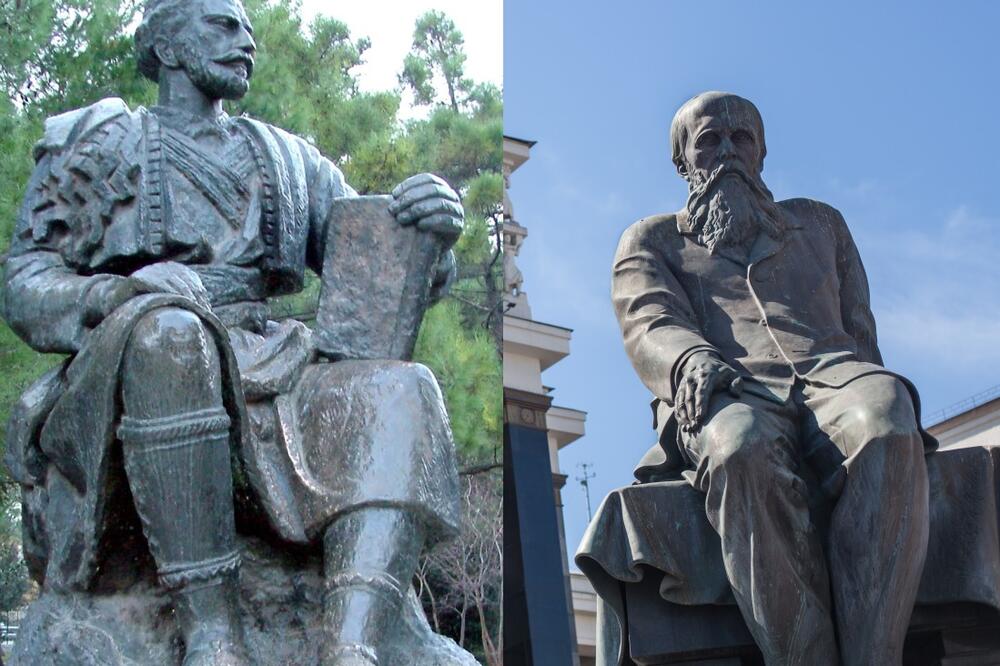By coincidence, two literary giants have found themselves in the spotlight these days, both, one would say, long ago condemned to a kind of public crucifixion. Deified on the one hand, but also destined for misunderstandings and wrong readings on the other. I guess there is no worship of God - without reading upside down.
This year, the anniversary - 200 years since the birth - was celebrated all over the world Fyodor Mikhailovich Dostoyevsky, and it will be introduced here Njegoshev day, as a national holiday.
Nothing unusual, one would say. Until you hear the local politicians. Are they talking, about Njegoš, about "traditional values and spirit"?
Giants are great because they don't fit into the so-called traditional values and such a spirit. If they fit into such a thing, we wouldn't even know about them today, or talk about them. Whether it's about Shakespeare, Dostoyevsky, To Dante or Njegoš.
But, when politicians begin to pack great men into their own molds and measure of spirituality, we get a caricature, and a double one at that. Both politicians and big men.
Even a great poet when you reduce him to a coordinate system of daily politics must suffer... I'm afraid that many who are looking forward to the new holiday, when they say Njegoš, they mean Ratko Mladić. And that is the worst that can happen to a great poet. Because, I will remind you, the real question is not whether Njegoš, but which Njegoš? National slogans or great literature? It depends on us, it is our mirror.
That is why, as a rule, great writers "die" when politicians get hold of them. Politicians do better with sacred texts... And writers, especially when they are really great, don't write such texts.
Fyodor Mihailovic has a similar problem with "readers". Those who read it as a religious manual overlook a great writer.
Nevertheless, a nice lecture - dialogue, happened a few days ago in CAN. Homage to Dostoyevsky, inspirational speech by the professor Siniš Jelušić, Dimitrije Popović presented "Diptych for Dostoevsky", which readers of this issue of Art can see on the middle pages.
Of course, in some earlier times, all of this would have looked different, perhaps because the attitude towards the great markers of culture and the cultural past, as well as civilizational identity, was somewhat different.
Such a writer's jubilee Records from the underground used to be the reason for dozens of forums, evenings, gatherings of one kind or another. I know, because I grew up in such a country. From student halls to centers of culture and elite institutions, at every step, you would hear about two centuries of Dostoyevsky. In the most popular TV formats of the time, such as Sunday Afternoon or Belgrade Chronicle, you would "run into" a Russian writer everywhere. "Comrade Dostoevsky, what kind of weather is waiting for us tomorrow?"
Njegoš, on the other hand, jubilees and celebrations were always spectacles of the highest order - social events par excellence equally in the era of monarchy or socialist republic.
The echo of one such event - a hundred years Gorski vienci, the great state celebration from 1947 - we will recognize it in the finale itself Kishov Tombs. When AA Darmolatov, who was among the distinguished international guests, very carelessly sat down in Njegoš's big chair...
Dostoyevsky, on the other hand, became a cult of his kind in SFRY in the eighties. A hyperactive professor Nikola Milošević edited the edition Dostoyevsky as a thinker in twenty volumes, collecting the most significant works of Russian theorists (Shestov, Berdjaev, Rozanov...) about or on the occasion of Dostoyevsky. They were authors whom the Soviet gravity kept in reliable darkness, which, of course, was reflected in their presence in Tito's Yugoslavia. What certainly sounds incredible today is that such an edition was printed in ten thousand copies and sold out very quickly. Perhaps a smart man could have guessed what awaits Yugoslavia. When the working people are so interested in Dostoyevsky, it can't be good...
Bonus video:





